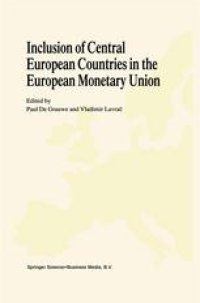
Ebook: Inclusion of Central European Countries in the European Monetary Union
- Tags: Macroeconomics/Monetary Economics, International Economics
- Year: 1999
- Publisher: Springer US
- Edition: 1
- Language: English
- pdf
The creation of the European Economic and Monetary Union (EMU) and the introduction of the euro is a historical event for the EU countries. The debates on the desirability of the EMU provoked a vast economic literature dealing with the theory of the optimum currency area, costs and benefits of the EMU, symmetric vs. asymmetric shocks, alternative mechanisms of adjustment in a monetary union and so forth. Until recently, for the Central European candidate countries for a full membership in the EU, these issues seemed to be too far away, as they concentrated on devising their own monetary and exchange rate systems suitable for their transition period. The challenges of the EMU for the Central European countries were practically not dealt with in both Western and Eastern economic literature. The present book aims to fill this gap, by focusing on the most direct issue of relevance for the Central European countries with respect to the EMU - why, how and when these countries are expected to join the EMU. The papers included in this volume study the relationship between the EU accession process of the Central European candidate countries and their involvement in the process of European monetary integration.
The creation of the EMU and the introduction of the Euro is a historic event for the EU countries. The debates on the desirability of the EMU provoked a vast economic literature dealing with the theory of the optimum currency area, costs and benefits of the EMU, symmetric versus asymmetric shocks, alternative mechanisms of adjustment in a monetary union and so forth. Until recently, for the Central European candidate countries for a full membership in the EU, these issues seemed to be too far away, as they concentrated on devising their own monetary and exchange rate systems suitable for their transition period. The challenges of the EMU for the Central European countries have scarcely been dealt with in both Western and Eastern economic literature.
Inclusion of Central European Countries in the European Monetary Union aims to fill this gap, by focusing on the most direct issue of relevance for the Central European countries with respect to the EMU - why, how and when these countries are expected to join the EMU. The papers included in this volume study the relationship between the EU accession process of the Central European candidate countries and their involvement in the process of European monetary integration. The book focuses on two main issues. First, are these countries - now or possibly later - a part of the European optimum currency area so that they should belong to the Euro area in the near future? Second, if so, how and when should they undertake necessary adjustments in their monetary and exchange rate policies and join the ERM 2 and the EMU?